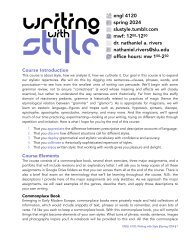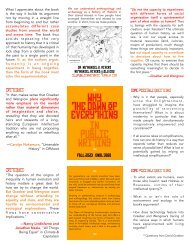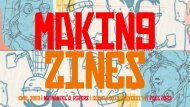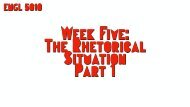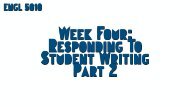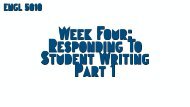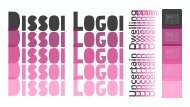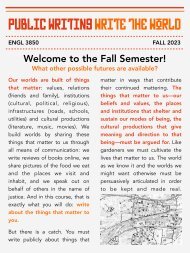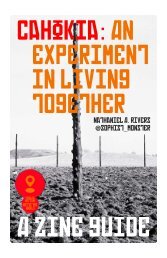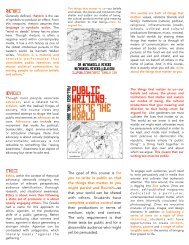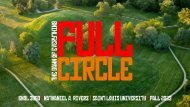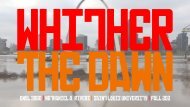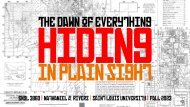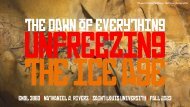ENGL 5010: Week Three/Tuesday Slide Deck
Erfolgreiche ePaper selbst erstellen
Machen Sie aus Ihren PDF Publikationen ein blätterbares Flipbook mit unserer einzigartigen Google optimierten e-Paper Software.
<strong>ENGL</strong> <strong>5010</strong><br />
<strong>Week</strong> <strong>Three</strong>:<br />
Writing Research
Hardin Marshall & Lynch 83<br />
Our innovation in these assignments<br />
comes from reconceiving writing as<br />
the laboratory in which thinking<br />
occurs rather than the delivery<br />
system of the results of thinking (i.e.,<br />
the familiar argumentative product).
Hardin Marshall & Lynch 88<br />
In effect, we are not asking students to make arguments but to<br />
construct the laboratory in which arguments will be made.<br />
We take the defamiliarization even further by asking students<br />
to engage in writing, as Latour puts it, as a “means to learn<br />
how to become sensitive to the contrary requirements, to the<br />
exigencies, to the pressures of conflicting agencies where<br />
none of them is really in command” (qtd. in Cooper 191).
Hardin Marshall & Lynch 93<br />
Our purpose is of course not to endorse “both sides.” Indeed, one<br />
of the effects of thorough research is the discovery that one opinion<br />
is far more persuasive than another. At those points, students—<br />
and all of us—need to be comfortable with the thought of<br />
changing our minds. Moreover, “openness,” a value instantiated in<br />
the 2011 CWPA Framework for Postsecondary Writing, is not<br />
cultivated by simply leaving one’s mind unlocked. It is cultivated by<br />
considering contrary opinions.
HOWARD AND JAMIESON 229<br />
it is hard to look at the results of the<br />
Citation Project research and imagine<br />
that the assigning of traditional<br />
research papers can be sustained in firstyear<br />
writing (FTW) courses.
HOWARD AND JAMIESON 240<br />
Without practice in engaged<br />
reading, s t u d e n t c a n d o<br />
nothing more than find killer<br />
quotes, stitch them together,<br />
cite them accurately, insert a<br />
thesis, can call it a day.
Cooper 188<br />
Experiments, whether in an actual<br />
laboratory or in a written text, are a<br />
way of engaging entities in a<br />
trajectory of composing knowledge.
Cooper 186<br />
If the student is to accompany entities in<br />
maintaining their substance, he, therefore,<br />
needs to engage in the parallel trajectory<br />
of the composing of knowledge—serial<br />
redescription.
Cooper 192<br />
“Going ‘forward’ now means that we become more and<br />
more ‘experienced,’ ‘cognizant,’ ‘attuned’ to the quality<br />
of the collective, coordinated, instituted knowledge.” Other<br />
requirements for the genesis of facts, which ends, rather<br />
than begins, with “direct perception,” include “successive<br />
rectification and revision” and “rectification by<br />
colleagues.”
Cooper 193<br />
What if writing teachers and their<br />
students thought of research as empirical<br />
and experimental—as producing new<br />
knowledge, not reporting what is known?
Cooper 198<br />
The student’s goal is perhaps<br />
ethnographic: to “deploy the<br />
content with all its connections” so as<br />
to exhibit, not explain, the context.
Cooper 198<br />
As she arranges them,<br />
t h e y t a k e o n n e w<br />
m e a n i n g s f r o m t h e<br />
various juxtapositions she<br />
tries out.
Norgaard 230<br />
Teaching becomes opportune when we<br />
listen to and address the class not as<br />
students taking a writing course but as<br />
writers working in a community of<br />
writers.
Norgaard<br />
231<br />
In a sense, workshops and<br />
seminars verbalize—and thus<br />
make available—the hidden<br />
dynamics of reader response.
Norgaard<br />
232<br />
Because workshops ask students to shuttle<br />
back and forth between actual writing and<br />
an array of potential strategies, we can<br />
model those moves for them—and they<br />
can test the moves on us.
Norgaard<br />
233-34<br />
If we are unhappy with the texts that<br />
students bring into a workshop, or with the<br />
discussion those texts elicit, we might look<br />
to our own assignments as moments of<br />
invention that shape the classroom.
Norgaard<br />
233-34<br />
Whatever option you choose, I encourage<br />
responsible reading and constructive criticism<br />
by putting readers on the line in class, lest<br />
the authors of the drafts feel they’re the only<br />
ones with a stake in the discussion.
Norgaard<br />
240<br />
That middle ground is techne—craft, knack,<br />
know-how—and it becomes the stage on which<br />
the workshop’s drama plays itself out. Techne is<br />
associated with the creative process, with the<br />
very “making” (poesis) of knowledge.
Rivers<br />
EP<br />
To write is to participate in language, culture and technology. To write is to participate<br />
in language, which moves us and makes our minds. Research suggests that we think in<br />
and with language. The language available to us affords and constrains how and what we<br />
write: vocabulary, concepts, patterns of thought. To write is to participate in culture,<br />
which is composed, in part, through shared texts: laws, religious writings, literature,<br />
codes of conduct, advertisements. Culture supplies the forms and expectations that<br />
shape how, when and why we write. To write is to participate in technology, through<br />
which writing becomes possible: the alphabet, pen and paper, printing presses, word<br />
processors as well as the networks that give rise to and support texts—their composition<br />
and circulation. We take part in these networks of meaning and matter. And our taking<br />
part is mutually informing: language, culture and technology are already on the<br />
scene for us to take up—shaping us as the writers we (have) become.




